SBS & ABC Recycling Issue
Media Statement
ABC Online
SBS Online
19 April 2018
The Victorian Local Governance Association (VLGA) is an independent not for profit (NFP) organisation that supports Victorian councils, their councillors and representatives from the diverse communities which these councils serve and represent.
The VLGA supports, facilitates and provides opportunities for networking, professional development and information exchange and actively engages with key policymakers and broader stakeholders to inform, influence and lead the conversations that determine the priorities for the local government sector in Victoria.
Regarding the current recycling issue, your readers might be aware that most councils have three bins: one for household waste. This bin normally goes to a “tip” or landfill site and the contents are buried.
There is also a “recycling bin” which is used for recyclable materials such as glass, paper and plastic. These are sent to recycling sorting facilities where they are separated and sold to various recycling facilities, some of which are based overseas.
Then there is a “green waste” or “organics” bin. Waste from these bins is sent to organic recycling facilities. The recycling and green waste bins are designed to divert waste away from landfill.
Depending on the market, some recycling sorting operators stockpile sorted materials until the price is more favourable. If the price of these sorted materials doesn’t improve, some may choose to send them to landfill, this would be a financial decision (e.g. if sorted paper is selling at $50 per ton and landfill is charging $48 per ton, the operator can sell at a profit, but it would be cheaper to bury the sorted material if the prices are reversed to avoid stockpiling).
In the case of the current recycling issue, China has refused to take “contaminated” plastic, meaning the sorting facilities need to sort out the plastics to a better quality for China to accept/buy them, this obviously increases the labour costs of the sorting facilities locally.
Therefore, until there is a commercially viable alternative to exporting recyclable plastics to China (such as building a local recycling facility), recycling operators will continue to export, even with increased labour costs.
This increase in labour costs will be passed to councils, and councils must absorb this cost or choose to pass this cost onto residents in the form of introducing or increasing waste levies. These levies can be separated out of the rates calculation and are therefore not subject to the current rate cap.
However, given the complexity of the issue, these are only stop-gap measures and a longer term sustainable solution must be found as a matter of priority.
The current business model of exporting our waste is flawed and not sustainable. Councils would like to explore a range of options in tackling waste, they include:
- Incentives and measures to support councils to work with residents to reduce waste, including reducing recyclable waste from households;
- Fast-track of roll out of organic recycling to reduce the amount of waste going to landfill;
- Increase capacity of local waste management initiatives such as regional waste to energy plants.
Councils cannot do this on their own. However, they are keen to work with the state government in exploring and implementing these options.
To do so, the VLGA calls on the state government to use the accumulated fund – known as the Sustainability Fund built from the Land Fill Levy which is a component of our annual rates charges and in turn - to explore and implement sustainable solutions to waste management.
Introduced in 1992, this Fund was intended to be used to improve and implement best practice waste management in Victoria and yet there now, in 2018, there appears to be no sustainable solutions to waste management in Victoria and Victorian communities are now faced with this problem that we are talking about.
In fact, in 2017 the Victorian Auditor General’s department – VAGO – proposed to conduct an audit of the Fund to investigate how much, if any, of this Fund, had been spent on best practice waste management solutions. The VLGA is not aware of the progress of this.
However, in response to this current situation, it is my understanding that the state government has formed a waste management taskforceat which local government, state government and the waste management industry are represented. We look forward to hearing more about the progress of the work of this taskforce.
.
The VLGA acknowledges the Traditional Owners of Country throughout Victoria and recognises their continuing connection to land, waters and community. We pay our respects to the Traditional Owners, their elders past, present and future, and to their cultures.
Disclaimer:
The advice provided by the VLGA is intended to be guidance only. It is not a substitute for legal or formal advice from relevant regulatory bodies.
© Victorian Local Governance Association 2023




